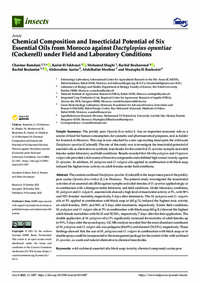Chemical Composition and Insecticidal Potential of Six Essential Oils from Morocco against Dactylopius opuntiae (Cockerell) under Field and Laboratory Conditions

Authors:
The prickly pear Opuntia ficus-indica L. has an important economic role as a
source of food for human consumption, for cosmetic and pharmaceutical purposes, and as fodder
for livestock in Morocco. This crop is now attacked by a new sap-sucking insect pest, the wild-scale
Dactylopius opuntiae (Cockerell). The aim of this study was to investigate the insecticidal potential of
essential oils as alternative to synthetic insecticides for the control of D. opuntiae nymphs and adult
females under laboratory and field conditions. Results revealed that Mentha pulegium and Origanum
vulgare oils provided a rich source of bioactive compounds and exhibited high contact toxicity against
D. opuntiae. In addition, M. pulegium and O. vulgaris oils applied in combination with black soap
induced the highest toxic activity on adult females under field conditions.
Abstract: The carmine cochineal Dactylopius opuntiae (Cockerell) is the major insect pest of the prickly-
pear cactus Opuntia ficus-indica (L.) in Morocco. The present study investigated the insecticidal
activities of six essential oils (EOs) against nymphs and adult females of D. opuntiae applied singly or
in combination with a detergent under laboratory and field conditions. Under laboratory conditions,
M. pulegium and O. vulgare L. essential oils showed a high level of insecticidal activity at 5%, with 98%
and 92% females’ mortality, respectively, 5 days after treatments. The M. pulegium and O. vulgaris
oils at 5% applied in combination with black soap at (60 g/L) induced the highest toxic activity
on adult females, 100% and 96% at 5 days after treatments, respectively. Under field conditions,
M. pulegium and O. vulgare oils at 5% in combination with black soap (60 g/L) showed the highest
adult female mortalities with 96.33 and 92.56%, respectively, 7 days after the first application. The
double application of M. pulegium oil at 5% significantly increased the mortality of adult females up
to 91%, 5 days after the second spray. GC-MS analysis revealed that the most abundant constituent
of M. pulegium and O. vulgare oils was pulegone (84.69%) and durenol (76.53%), respectively. These
findings showed that the use of M. pulegium and O. vulgare in combination with black soap or in
double sprays could be incorporated in the management package for the control of the wild cochineal
D. opuntiae, as a safe and natural alternative to chemical insecticides
